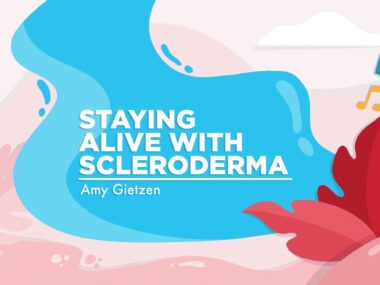The Personal Choice of Telling My Bosses I Have Scleroderma
Written by |

My classroom door flung open, and the principal of the school where I work swiftly entered. Closely behind her was our school officer. Realizing there was some kind of emergency, I headed toward them to find out what my next steps were. As I approached the hall, I realized the entire school emergency response team was outside my room. My heart instantly began racing, but I maintained a casual smile for the sake of my students.
“Are you OK?” the principal asked in a calm, quiet voice.
In 2019, our school district implemented a system to decrease response time for emergencies. All staff wear a special electronic badge. When the badge button is pressed eight times, the school’s emergency team and local police are dispatched immediately to the exact location of the badge. If it’s pressed three times, as it was in this case, only the school response team is alerted.
A few minutes before they arrived, I was carrying a stack of laptops back to the charging station. Because the muscles in my arms are weak, I was using my hips to brace my hands under the heavy load. As I walked, the laptops were banging up against my emergency badge that was dangling around my neck. I accidentally triggered the alarm.
On their way to my room, the response team was sure I was in medical distress. Over the years, I’ve had my share of hospital stays and emergencies. So, they were all prepared for the unexpected and shocked when it was just a false alarm. This time, we all had a good laugh and the team was grateful for the false alarm as they returned to their regular routines. Of course, they were much more awake after an unexpected morning sprint!
Scleroderma is not my secret
When I was diagnosed eight years ago, I decided to tell my bosses right away. I felt it was important to be transparent for many reasons. First, I wasn’t sure how quickly the progression was going to happen. I wanted to make sure we had a backup plan for my third graders. Second, I’m a “wear my heart on my sleeve” type of person. I speak openly about my struggles and triumphs because I believe it’s important to be proud of who I am — perfectly imperfect.
I don’t regret telling the administrative staff at my school. They have shown only compassion and support. When I couldn’t walk far without getting winded, they helped by coordinating my schedules with my colleagues to limit the distance I had to go. When I was on crutches, they made sure my mail was delivered to my classroom. Their actions have always shown acceptance of my disabilities, as well as the value I have as a professional, despite my physical limitations.
I do realize how fortunate I am, considering not all employers are created equal. It takes compassion and acceptance to support people with disabilities. I’m lucky I was already working for these types of people when my illness began.
Telling others is a personal decision
People often ask me if they should tell their friends and employers about a diagnosis. I wish I had the perfect answer, but no one can make that decision for anyone else — it’s personal.
I can share what helped me come to my decision. Long before my diagnosis, when I was still in college, I read an article about sharing personal information with others. My takeaway from the article was there are two reasons for sharing my struggles: to help others understand or to seek sympathy. The author explained how sympathy comes from others, and it’s not always a good idea to ask for it. Since not everyone is willing to give it, I could be setting myself up for disappointment and emotional pain.
Since my goal was to help others understand my illness, I decided to divulge my diagnosis to everyone. I wanted to be the voice to teach others about this rare disease called scleroderma. I wanted to help build a world more accepting of chronic illness and to help others see the value every person has to offer, even if they have health issues.
When I decided to tell my job about my chronic autoimmune disease, I was ready for a fight and prepared for the backlash that could’ve come from this decision. Instead, the people I told came running to my aid when I hit a button three times. What a world it’s going to be when all rare communities feel that kind of acceptance and support.
Note: Scleroderma News is strictly a news and information website about the disease. It does not provide medical advice, diagnosis, or treatment. This content is not intended to be a substitute for professional medical advice, diagnosis, or treatment. Always seek the advice of your physician or other qualified health provider with any questions you may have regarding a medical condition. Never disregard professional medical advice or delay in seeking it because of something you have read on this website. The opinions expressed in this column are not those of Scleroderma News or its parent company, Bionews, and are intended to spark discussion about issues pertaining to scleroderma.







Maria McDonald
I worked for a major tech company when I started having symptoms of scleroderma, and was diagnosed at the Johns Hopkins Scleroderma Clinic. Instead of helping me, the company I worked for continued to deny short or long term disability, ended my employment with a day's notice in 2018. So, Im sorry to say that everyone does not have a supportive employer experience. I have chosen not to disclose my medical condition. I have lost a lot of faith in the system. I have sine scleroderma so it is not immediately obvious.